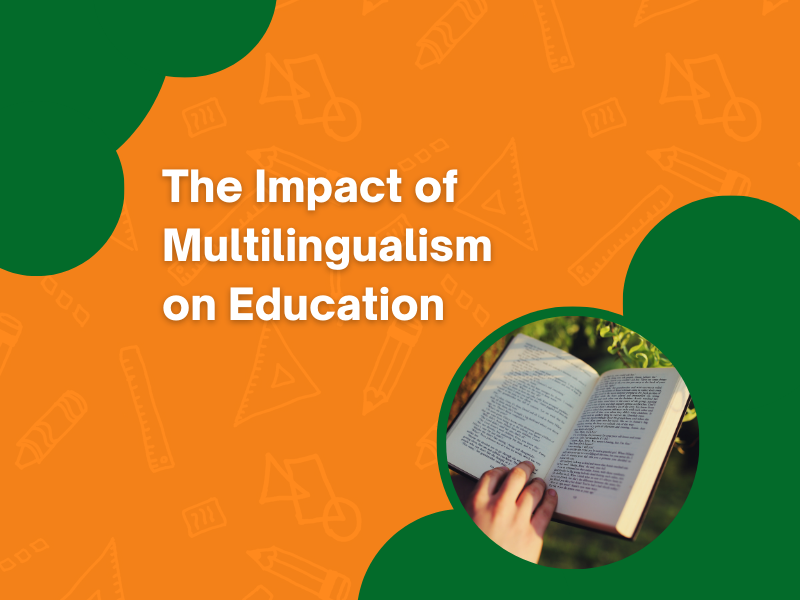Multilingualism, with its ability to comprehend and communicate across multiple languages, holds immense significance in the field of education. As our world becomes more interconnected, the recognition and exploration of multilingualism’s impact on education become imperative. This comprehensive article delves into the positive effects of multilingualism on various aspects of education, encompassing cognitive development, academic accomplishments, cultural appreciation, and prospects. By understanding the far-reaching benefits of multilingualism, we can embrace linguistic diversity and unlock its potential in the realm of education.
Cognitive Benefits of Multilingualism
Multilingualism offers a range of cognitive benefits that positively impact individuals. By engaging in multiple languages, individuals sharpen their problem-solving skills, enabling them to approach challenges from diverse perspectives. Critical thinking abilities are enhanced, facilitating a deeper understanding and analysis of complex ideas. Multilingualism promotes mental flexibility, allowing individuals to effortlessly switch between languages and tasks. Furthermore, it stimulates brain development, enhancing memory, attention span, and information processing capabilities. The ability to multitask and exhibit efficient executive functions further strengthens cognitive abilities. Overall, multilingualism nurtures a dynamic and agile mental framework, contributing to enhanced cognitive performance and adaptability.
Academic Achievement and Language Skills
Multilingualism plays a vital role in academic achievement, empowering students with enhanced language skills and proficiency across multiple languages. By engaging with various languages, multilingual students develop robust reading comprehension, expanding their ability to understand and interpret diverse texts. Their vocabulary acquisition flourishes, enabling them to express ideas more effectively. Furthermore, learning multiple languages fosters metalinguistic awareness, empowering students to analyze language structures and apply effective language-learning strategies. This heightened language proficiency equips students with valuable tools for academic success and enables them to excel in their educational journey.
Cultural Understanding and Global Perspective
Multilingualism serves as a gateway to cultural understanding and nurtures empathy among individuals. By embracing multiple languages, individuals gain access to different cultures and perspectives, enabling effective communication and connection with diverse communities. This promotes social cohesion and the development of intercultural competence. Multilingualism fosters an appreciation for cultural diversity, breaking down barriers and promoting a global mindset. By exploring various languages, individuals cultivate a deeper understanding of different customs, traditions, and values, fostering mutual respect and creating a more harmonious and interconnected world.
Enhanced Problem-Solving and Creativity
Multilingualism empowers individuals with heightened problem-solving skills by exposing them to diverse linguistic and cultural problem-solving approaches. This broadened perspective enables them to approach challenges from different angles, fostering innovative and effective solutions. Additionally, multilingualism promotes creativity by expanding individuals’ linguistic repertoires, allowing them to express ideas and concepts in unique and nuanced ways. This linguistic versatility nurtures creativity across various disciplines, from literature and arts to scientific innovation and critical thinking. Ultimately, multilingualism serves as a catalyst for enhanced problem-solving abilities and unleashes the boundless potential of creativity in individuals.
Improved Metacognitive Skills
Multilingualism nurtures improved metacognitive skills, empowering students to reflect on their own learning processes and strategies. Multilingual learners develop heightened metacognitive awareness, recognizing how different languages may influence their thinking and learning approaches. This self-awareness enables them to adapt and modify their language-learning techniques effectively. By understanding the impact of language on cognition, multilingual individuals gain valuable insights into their own learning strengths and areas for improvement. This metacognitive regulation enhances their overall language learning experience and facilitates more efficient and successful language acquisition.
Future Opportunities and Career Advantages
Multilingualism offers individuals a significant advantage in future opportunities and career prospects. With their valuable language skills and cultural competence, multilingual individuals stand out in the competitive job market. Being able to communicate effectively in multiple languages opens doors to international careers, cross-cultural collaborations, and global networking opportunities. Moreover, multilingualism enhances adaptability and flexibility, qualities highly valued in an interconnected and rapidly evolving world. By embracing multilingualism, individuals not only expand their professional horizons but also cultivate a global mindset, positioning themselves for success in an increasingly globalized society.
Challenges and Support for Multilingual Education
Multilingual education presents its own set of challenges that need to be addressed to ensure optimal outcomes. Language proficiency levels, varying instructional strategies, and educational policies require attention and support. By providing qualified teachers, appropriate materials, and inclusive language policies, we can ensure equitable access to quality education for multilingual learners. Addressing these challenges will empower multilingual learners to thrive academically and harness the full potential of their linguistic abilities. It is through such dedicated support and resources that we can create an inclusive educational environment that values and nurtures the linguistic diversity of our students.
Conclusion
In conclusion, multilingualism emerges as a powerful force in shaping education for the betterment of individuals and communities. Its impact spans cognitive development, academic achievement, cultural understanding, and future prospects. By embracing multilingualism, learners unlock their cognitive potential, bolster academic success, and cultivate empathy towards diverse cultures. Multilingualism also ignites creativity, enhances metacognitive skills, and offers a competitive edge in a globalized job market. However, the journey towards effective multilingual education necessitates addressing challenges and providing adequate support. Through qualified teachers, inclusive policies, and appropriate resources, we can create an inclusive educational landscape that celebrates linguistic diversity and fosters optimal learning experiences. By nurturing multilingualism, we pave the way for a brighter future, where individuals thrive in a connected and harmonious world, valuing the richness that diverse languages and cultures bring.

